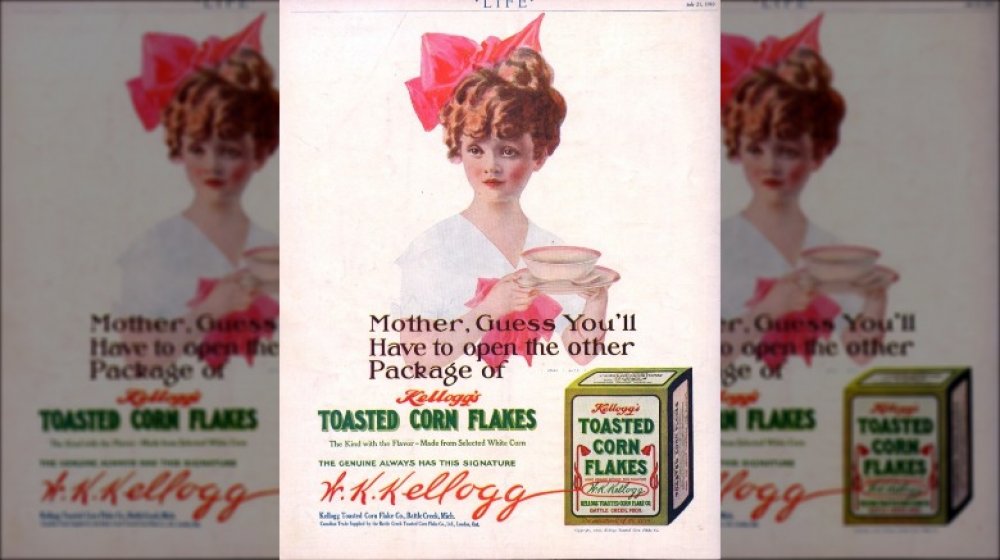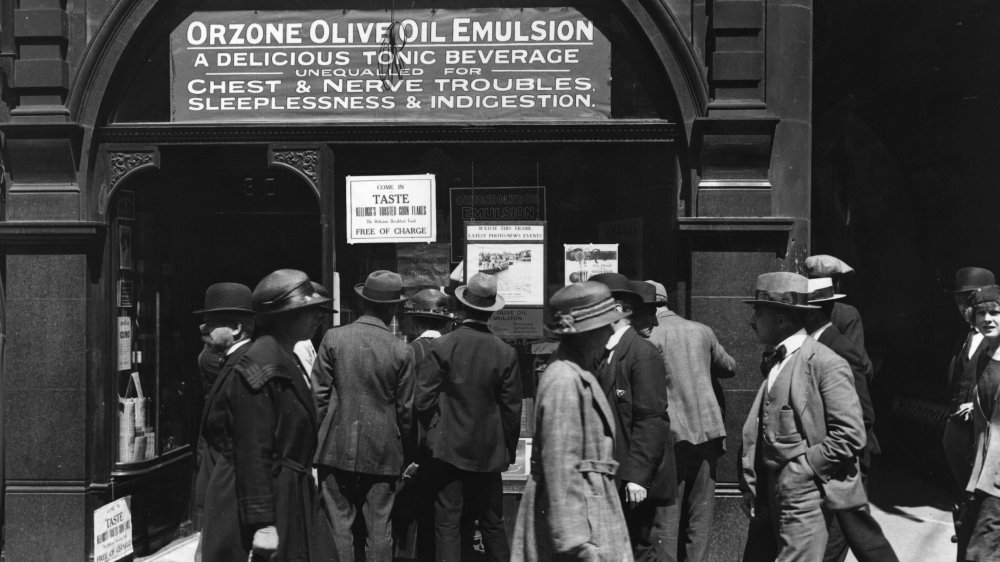The Real Reason Breakfast Cereal Was Invented
In 2019, Kellogg's released a purple special edition LGBTQ-friendly "All Together" box of cereal (via CBS). When it did, John Harvey Kellogg, cornflakes inventor and the father of breakfast cereals, probably had a temper tantrum in his grave.
If you read Kellogg's work, it's hard to avoid the conclusion that he thought of himself as a superhero who fought evil with bland food, most famously cornflakes. In 1895, when he filed a patent for "flaked cereals," he did so as part of his battle against "dyspepsia [indigestion] among civilized people." Kellogg – who had invented the cereal with his brother, Will – prepared the "thoroughly cooked," "compressed" flakes along with other cereals, including "Browned Rice" and "Malted Nuts," at Battle Creek Sanitarium Health Food Co for his patients at Battle Creek Sanitarium (via Kellogg's 1903 work, The Living Temple).
Other than bland cereals, what did Kellogg serve up at this exclusive health spa? Thousands of patients traveled to Battle Creek to be shocked with electricity, pelted with water, and sit in diapers on strange, mechanical horses (via Jezebel and Gizmodo). One such patient, Charles William Post, was so impressed with Kelloggs' cereals that he later founded his own line of breakfast food, including Postum Cereal Coffee, and Grape-Nuts. He wasn't the only one. In the years after Kellogg introduced cornflakes, more than 100 companies flocked to Battle Creek to emulate his process (via the Wharton School). Just like that, America's love story with breakfast cereals began.
Were cornflakes invented to stifle desire?
You might have heard rumors that cornflakes were invented as "part of an anti-masturbation crusade" (via Mentalfloss). Snopes rates this position as "mostly false." Here are the basics. Kellogg was not a fan of self-stimulation, which he described as "a sin against nature" in his book, Plain Facts for Old and Young. The doctor never explicitly recommended eating cornflakes to stifle sexual desires but rather to aid digestion. However, the cereal was certainly the antithesis of the stimulant-filled diet that Kellogg thought encouraged "abominable" behaviors.
"Tea and coffee have led thousands to perdition," Kellogg argued. Candies, spices, cinnamon, cloves, peppermint, vinegar, mustard, horseradish, salt, and pepper? All hard nos. Per Kellogg, these induced dangerously heightened emotions, leading to "insanity," "hysteria," "profound melancholy," "hopeless" lunacy, "idiocy," "premature and defective development," and "untrustworthiness." To promote docility and civility, he recommended "the most simple, pure, and unstimulating diet."
While Kellogg may have been a respected scientist at the turn of the 20th century, when it comes to these dietary recommendations, he was (to put it lightly) off his rocker. There is, for example, no scientific evidence that drinking tea or eating a cinnamon-heavy diet leads to any kind of improper behavior. Ironically, the procedures involved in processing grains to make breakfast cereals like cornflakes may produce toxic compounds that do real damage to your health (via Spoon University).
How cornflakes helped fund a racial purity movement
You're looking at a pharmacy advertising free samples of Kellogg's cornflakes in 1923. In 1906, Kellogg's brother, Will, successfully commercialized a sweeter version of the cereal for mass consumption (via NPR). John Harvey Kellogg, meanwhile, had invested money from cornflake dividends into the eugenics movement, funding, among other things, the Race Betterment Foundation (via Eugenics Archive) and three high-profile national eugenics conferences.
Kellogg's advocated euthenics. In his words, he sought to create a new race within a century" based on "the principles of healthful living and scientific breeding" (via the American Journal of Public Health). He never specifically named cornflakes as part of his euthenics campaign. He did, however, lobby for the implementation of a Big Brother-esque, state-supported, racist nutrition program. Not only did Kellogg suggest putting the "whole population under government medical supervision," but he also suggested a nationwide education campaign based on the "general principles of eugenics" in which "every man woman and child in the whole United States" would be taught "wholesome methods in the preparation of foods." He went so far as to suggest that "prizes should be offered for the finest families and the best health endurance records."
Dr. Howard Markel, who researched Kellogg extensively, said that Kellogg's ideas were out there even for eugenicists. His proposals, thank goodness, were never adopted.


